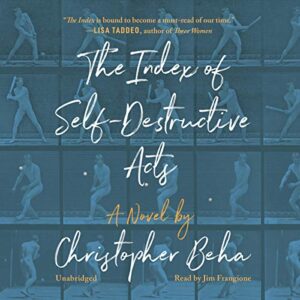Spoiler Alert: The following essay describes significant plot details of the 2021 movie, The Lost Daughter.
One way or another, it seems that the thing I keep writing about around here is fragmentation.
Last time here, I wrote about the effort to recover my attention through an absurdly minimal fast from Twitter on Sundays—which, I’m pleased to report, has become an ongoing habit. There was also a blissful two weeks in early February in which I had no smartphone access. How placid and margin-filled those days came to feel.
It’s not for nothing that we tend to blame the contemporary feeling of fragmentation on the ascendancy of digital technologies—there’s a cottage industry dedicated to counting the ways, from Jean M. Twenge’s bellwether cataloguing of the negative effects on teens, to the just-published Stolen Focus: Why You Can’t Pay Attention, by Johann Hari. (“Your attention wasn’t lost,” the press releases all say. “It was stolen!”)
I don’t doubt that, one bit.
Stolen attention is a feeling that was already deeply familiar to women, particularly mothers. And especially mothers who are also seeking to foster an intellectual life.
So I was paying attention, a couple of months ago, when I received a group text from a friend asking our group if we had seen the Maggie Gyllenhaal-directed film The Lost Daughter, adapted from Elena Ferrante’s novel of the same name, and saying how disturbed she was by its portrayal of motherhood.
The friend authoring the text is both a mother and a philosophy professor; the other two friends on the thread besides me are a writer and the vice president of government relations for a pharmaceutical firm. All of us are mothers.
All of us, it turns out, were pretty disturbed/annoyed by The Lost Daughter. If you’ve not seen it, the plot revolves around a midlife female academic’s attempt at having a “working holiday” in a Greek resort town, where her respite is regularly breached by a loud and boisterous Greek-American family who overrun the beach. The central action of the plot turns around her growing closeness to and toleration of the family—who very literally encroach upon her space and her reading—and her sympathy for a very young mother of the clan who is desperate to get some alone-time away from the ever-present demands of her toddler daughter.
Interspersed with the present-day beach action are flashbacks to the protagonist Leda’s own years as a young mother and her attempts to gain her children’s silence (in fact, to sideline their attention!) so she can do just a bit more work on her research. And OH! I could relate so much to this impulse, a constant in my own life: My own child mentioned in her letter to Santa Claus about “how hard my parents work,” and that if only Mommy stopped “writing her stupid book” we could have more fun times together.
But—following the line of the flashbacks—the back-and-forth pull between children and vocation for Leda doesn’t let up. Rather, it becomes increasingly heated, and her determination to wrest that confirmation of personal identity—delivering a research paper at a prestigious international conference—is met with overwhelming success. Her work is a triumph.
The result of that triumph is that she feels emboldened, after the conference and returning to her family in the United States (though she is, oddly, a Brit), to abandon her family entirely—including her perplexed husband and her two, under-age-5 daughters. Three years pass, we learn, before she sees the daughters again. It is an Infinity of time to be gone.
The balance of The Lost Daughter seems to be a long, emphatic justification for why Leda’s behavior is acceptable. The press around the film is mostly couched as a celebration of the film’s edginess, its “authentic” depiction of a mother’s mixed emotions about motherhood.
Back in the present-day plot, the character’s middle-aged boldness evidences itself in some normal ways—she’s comfortable in her skin in a way that the overtly sexy Greek-American women are not—and also in some not-normal ones: she does some peculiar things (stealing a child’s doll, for example) that can be read both as deriving from her guilt at abandoning her daughters, and a strange kind of revenge at the hyperfeminine mothers in the Greek-American family, who are destroying her mellow beach vibe. And, by extension, her research.
On one level, it would seem clear that the film is trying merely to “make space” for this taboo emotion while not justifying maternal abandonment, and that’s certainly how the general media acclaim has tended to regard it. And the mother does seem to have regrets for her impetuous decision.
But I think the film is telling another story as well. In portraying the large, extended Greek-American family as distinctly vulgar (and dangerous), the representation acts as an indictment, in the frame, of what the film posits as their uncontrolled fertility. It is THAT that has set all the women against one another—and especially against Leda.
It is the female academic, who clearly loves her now-grown daughters, who holds the balance of power within the frame. Because those daughters are held distant, far from her own sacrosanct silence.
I’m not choosing the silence. I sure as hell have not chosen a Room of My Own. And you could say that I am paying the consequences for it: the very table on which I am writing at the moment holds craft supplies for a medieval manor school project, assorted W-2s and 1099s, and my book draft is a minimized tab at the bottom of the screen—at least until morning.
There’s a moment at the end of The Lost Daughter when Leda awakens at dawn on a beach, when we had no expectation that she was actually going to live, and her cell phone rings. It is one of Leda’s adult daughters calling, and Leda answers with such joy that the scene represents a kind of resurrection, a rebirth for her.
But I saw it more negatively—Leda’s poor old daughter, forced to be the adult in the position of “raising” the parent. As one of those kinds of adult children myself, it’s a fate I’d go to any lengths to spare my child.
Even if it means a life—and a body of art—that is fragmented and partial. It is the burden and the grace of the world I’ve been given, to have spun off two glorious Wholes.
For Angela Knobel, Amy Chevalier Efantis, and Heather Ferngren Morton
Caroline Langston was a regular contributor to Image’s Good Letters blog, and is writing a memoir about the U.S. cultural divide. She has contributed to Sojourners’ God’s Politics blog, and aired several commentaries on NPR’s All Things Considered, in addition to writing book reviews for Image, Books and Culture, and other outlets. She is a native of Yazoo City, Mississippi, and a convert to the Eastern Orthodox Church. She lives outside Washington, D.C., with her husband and two children.





